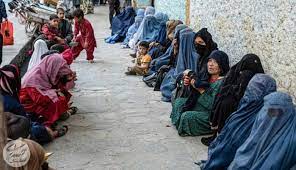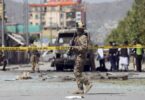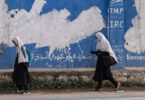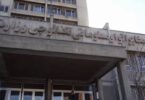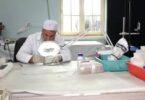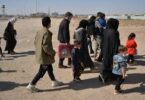KABUL (Khaama Press): The prohibition of women from work and numerous other restrictions that exclude them from the workforce and other social interactions have led to one of the most alarming crises.
However, no hopeful initiatives have been taken to support women’s freedom and family economies. In this report, you will read the story of a family whose members have lost their jobs due to imposed restrictions, experiencing “the worst days of their lives.” This narrative sheds light on the pressing need for actions that champion women’s freedom and the economic well-being of families.
Medina, a young makeup artist living in the western part of Kabul, is the breadwinner for her six-member family. She told Khaama Press that she used to cover her family’s expenses through her makeup artistry.
However, she is no longer able to support her family because, according to the ideology of the Taliban administration, women are not allowed to work or provide for their families. This highlights the stark challenges faced by women like Medina, who, despite having the skills and determination, are denied the opportunity to contribute to their families’ well-being due to restrictive ideological beliefs.
Medina lost her father approximately 11 years ago, and her mother served in the ranks of the former government’s police forces in Ghazni province. These two family breadwinners have once again become confined to their homes with the return of the Taliban. The mother, afflicted with diabetes, requires medical attention, and Medina herself suffers from the anguish of unemployment and challenging economic conditions.
Since the Taliban’s return to Afghanistan, Medina and her two sisters, Mursal and Farahnaz, have been deprived of education, and their motivation for learning has now dwindled.
Medina says, “I am responsible for providing for a six-member family. When my two beauty salon jobs were blocked, the distress of finding bread for my family tormented me. There are even nights when we go to bed hungry.”
The leadership of the Taliban issued a decree in July of this year, immediately implementing a nationwide ban on beauty salons. According to reports from United Nations agencies and statistics compiled by the Khaama Press, this decree has destroyed the livelihoods of 60,000 women in the beauty industry.
Mursal, Medina’s younger sister, was in seventh grade when the school gates were closed to girls beyond the sixth grade. Mursal reveals that she clandestinely attended a “hidden school.” Still, after a while, authorities of the Taliban administration became aware of this and shut down the secret school as well.
At that time, Medina’s younger sister also played football. She shares, “I used to play football with a group of girls my age near our school, but the Taliban warned the sports club officials not to allow us anymore.”
Before the arrival of the Taliban, Medina spent her days at the beauty salon and shared her evenings at the “night school.” Farahnaz, another sister of Medina, was in the tenth grade when, with the establishment of the Taliban regime, the three sisters were simultaneously deprived of education.
However, the weight of responsibilities still rests on Medina’s shoulders, and she remains concerned about her and her sisters’ futures.
She describes a night when she, along with her sisters and a younger brother, went to bed hungry: “One day, my mother had gone to Ghazni, and there was no money with me. My sisters, my little brother, and I slept hungry that night and spent the morning still hungry until I borrowed money for a bag of flour from a friend.”
The United Nations Assistance Mission in Afghanistan, or UNAMA, reports that around 50 restrictive decrees have been issued by the Taliban authorities, each destroying segments of women’s freedoms.
The prohibition of work, education, and training for women, alongside restrictions on women’s movement, is among the significant constraints imposed by the Taliban on women. These prohibitions have been met with widespread international reactions, but practical steps to reverse this trend have yet to be taken.

